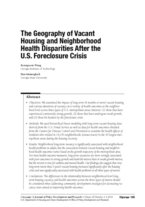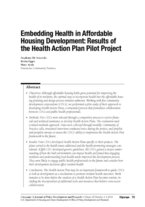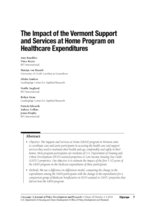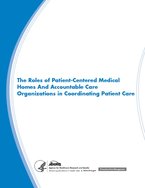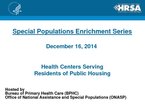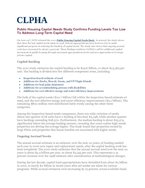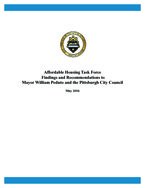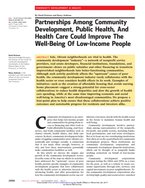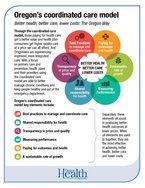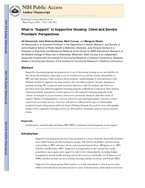Found 859 resources.
0
0
0
The Every Student Succeeds Act of 2015 (ESSA) amended the McKinney-Vento Act’s Education for Homeless Children and Youth program, as well as Title I, Part A of the Elementary and Secondary Education Act. The ESSA amendments include many provisions designed to improve training, identification, enrollment, stability, and
success, from pre-school through high school, and the transition to post-secondary education. A brief summary is provided.
Topics: Early childhood, Education, Homelessness, Legislation & Policy
 Shared by Housing Is
on Aug 9, 2018
Shared by Housing Is
on Aug 9, 2018 0
0
0
This short document provides basic information to help housing and homeless assistance providers advocate with their families and youth for appropriate educational services, from birth through higher education. The rights and protections outlined here apply to all children and youth experiencing homelessness, as defined by the education subtitle of the McKinney-Vento Act.
Topics: Child welfare, Early childhood, Education, Homelessness, Legislation & Policy, Low-income, School-readiness
 Shared by Housing Is
on Aug 9, 2018
Shared by Housing Is
on Aug 9, 2018 0
1
0
We examined the impact of long-term (6 months or more) vacant housing and various durations of vacancy on a variety of health outcomes at the neighborhood level across three types of U.S. metropolitan areas (metros): (1) those that have experienced consistently strong growth, (2) those that have undergone weak growth, and (3) those hit hardest by the foreclosure crisis
Topics: Asset building, Asthma, Community development, Health, Housing, Low-income, Mental health, Metrics, Research, Safety, Transportation
 Shared by Housing Is
on Aug 1, 2018
Shared by Housing Is
on Aug 1, 2018 0
0
0
Homelessness among children is correlated with developmental delays, fair or poor health, and high healthcare utilization. Associations of homelessness specifically among infants younger than 12 months, however, are unknown. This study evaluates homelessness during infancy as a risk for adverse infant and maternal health and hardship.
Topics: Child welfare, Depression, Disabilities, Dual-generation, Early childhood, Education, Family engagement, Food insecurity, Grade-level proficiency, Health, Homelessness, Housing, Low-income, Metrics, Partnerships, Pre-natal, Research, School-readiness, Youth
 Shared by Housing Is
on Aug 1, 2018
Shared by Housing Is
on Aug 1, 2018 0
0
0
This study draws on qualitative interview data to examine transitions into rent-assisted housing as they relate to diabetes self-management behaviors.
Topics: East Coast, Health, Homelessness, Housing, Low-income, Mental health, Metrics, Nutrition, Research, Stability
 Shared by Housing Is
on Aug 1, 2018
Shared by Housing Is
on Aug 1, 2018 0
0
0
Although affordable housing holds great potential for improving the
health of its residents, the optimal way to incorporate health into the affordable housing planning and design process remains unknown. Working with five community development corporations (CDCs), we performed a pilot study of their approach to developing Health Action Plans, a structured process that formalizes collaboration
between CDCs and public health professionals.
Topics: Depression, Green, Health, Housing, Low-income, Partnerships, Research
 Shared by Housing Is
on Aug 1, 2018
Shared by Housing Is
on Aug 1, 2018 0
0
0
We sought to learn more about how state- and locally funded rental
assistance programs were created, how they are structured, whom they serve, and how they are funded.
Topics: Cost effectiveness, Data sharing, Disabilities, Family engagement, Funding, Health, Homelessness, Housing, Legislation & Policy, Low-income, Partnerships, Research, Supportive housing
 Shared by Housing Is
on Aug 1, 2018
Shared by Housing Is
on Aug 1, 2018 0
0
0
The Support and Services at Home (SASH) program in Vermont aims
to coordinate care and assist participants in accessing the health care and support services they need to maintain their health and age comfortably and safely in their homes. Most program participants are residents of U.S. Department of Housing and Urban Development (HUD)-assisted properties or Low-Income Housing Tax Credit
(LIHTC) properties. Our objective is to estimate the impact of the first 5 1/2 years of the SASH program on the Medicare expenditures of these participants.
Topics: Cost effectiveness, Dual-eligibles, East Coast, Health, Home visiting, Housing, Legislation & Policy, Low-income, Medicaid / Medicare, Metrics, Seniors
 Shared by Housing Is
on Aug 1, 2018
Shared by Housing Is
on Aug 1, 2018 0
0
0
This report aims to provide the Robert Wood Johnson Foundation (RWJF) and other health foundations with a perspective on the emerging intersection of social determinants of health (SDOH), health care systems, and social and other services. These fields intersect in how and what data are collected, and in ways the data are used to improve health and well-being and promote a Culture of Health.
Topics: Data sharing, Funding, Health, Medicaid / Medicare, Metrics, Nutrition, Partnerships, Place-based, Research
 Shared by Housing Is
on Jul 27, 2018
Shared by Housing Is
on Jul 27, 2018 0
0
0
The effective coordination of a patient’s health care services is a key component of high quality and efficient care. In this brief we first describe the goals of care coordination and the central role for primary care, followed by the specific activities involved in care coordination. Next we summarize the evidence on the effectiveness of different care coordination activities that PCMHs and ACOs can pursue. Finally, we suggest roles for PCMHs and ACOs in coordinating care and summarize key points.
Topics: Data sharing, Health, Partnerships, Preventative care
 Shared by Housing Is
on Jul 27, 2018
Shared by Housing Is
on Jul 27, 2018 0
0
0
Anthem’s affiliated health plans and other managed care organizations (MCOs) increasingly are helping Medicaid members who are diagnosed with mental health conditions and substance use disorders (MH/SUD) find stable housing, secure meaningful employment, and address a range of financial and daily life challenges.
Topics: Affordable Care Act, Cost effectiveness, Depression, Funding, Health, Housing, Medicaid / Medicare, Mental health, Nutrition, Substance abuse, Supportive housing, Workforce development
 Shared by Housing Is
on Jul 27, 2018
Shared by Housing Is
on Jul 27, 2018 0
0
0
Topics: Asthma, East Coast, Health, Healthy homes, Housing, Low-income, Partnerships, Supportive housing
 Shared by Housing Is
on Jul 27, 2018
Shared by Housing Is
on Jul 27, 2018 0
0
0
For fiscal year 2013, the Department requests $2.07 billion for the Public Housing Capital Fund to address development, rehabilitation, modernization and preservation needs of the Public Housing portfolio. While funding the Capital Fund at the requested level of $195 million over the fiscal year 2012 appropriation will not enable PHAs to meet all existing capital and accrual needs for fiscal year 2013, funding at this level will provide PHAs with some ability to prevent their housing stock from falling into a state of obsolescence, disrepair, and/or removal from inventory.
Topics: Funding, Green, Legislation & Policy, MTW, Sustainability
 Shared by Housing Is
on Jul 27, 2018
Shared by Housing Is
on Jul 27, 2018 0
0
0
Public Housing Capital Needs Study Confirms Funding Levels Too Low to Address Long-Term Capital Need
On June 24th, HUD released the 2010 Public Housing Capital Needs Study. In general, the study shows that since the last capital needs study in 1998, federal appropriations have been too low to make significant progress at reducing the backlog of capital needs. The study also shows that ongoing accrual costs have increased by about 15 percent. These findings reinforce CLPHA’s call for additional capital investment in public housing through increased appropriations levels and new approaches to leverage private capital.
Topics: Cost effectiveness, Disabilities, Energy, Funding, Lead, RAD, Research
 Shared by Housing Is
on Jul 27, 2018
Shared by Housing Is
on Jul 27, 2018 0
0
0
On January 1, 2014, in states that have chosen to expand Medicaid eligibility under the Affordable Care Act, nearly all chronically homeless people who lacked health insurance became eligible for Medicaid. This Primer offers state Medicaid officials and other interested parties strategies for using Medicaid to meet the needs of this very vulnerable population--some strategies that have succeeded in the past and some that are emerging under provisions of the Affordable Care Act.
Topics: Affordable Care Act, Criminal justice, Disabilities, Dual-eligibles, Funding, Health, Homelessness, Housing, Low-income, Medicaid / Medicare, Mental health, Partnerships, Stability, Substance abuse, Supportive housing
 Shared by Housing Is
on Jul 27, 2018
Shared by Housing Is
on Jul 27, 2018 0
0
0

Health promotion interventions in public housing communities have the potential to reduce obesity among residents, a new study shows. Changes in their environment, such as fresh food trucks, walking groups, screenings, and cooking demos, helped Boston residents eat better and get more exercise.
Topics: East Coast, Exercise, Food insecurity, Health, Housing, Low-income, Nutrition, Obesity, Research
 Shared by Housing Is
on Jul 27, 2018
Shared by Housing Is
on Jul 27, 2018 0
0
0
SAHF members believe that connecting residents of affordable housing with needed supports – such as educational resources or health services – can help vulnerable families and seniors achieve
a better quality of life. SAHF began the Outcomes Initiative to create a common framework for its members to demonstrate with data the impact on residents of providing housing-based services and support in the five key areas listed below.
Topics: Asset building, Cost effectiveness, Dual-generation, Education, Exercise, Food insecurity, Health, Housing, Mental health, Metrics, Nutrition, Safety, Stability
 Shared by Housing Is
on Jul 26, 2018
Shared by Housing Is
on Jul 26, 2018 0
0
0
Although public-private partnerships (PPPs) have attracted practitioner and academic interest over the last two decades, there has been no attempt to integrate the general and health management literature to provide a holistic view of PPPs in healthcare delivery. This study analyzes over 1,400 publications from a wide range of disciplines over a 20-year time period. It synthesizes formerly dispersed research perspectives into a comprehensive multi-dimensional framework of public-private partnerships, and in so doing, provides new directions for further research and practice.
Topics: Community development, Funding, Metrics, Partnerships, Research
 Shared by Housing Is
on Jul 24, 2018
Shared by Housing Is
on Jul 24, 2018 0
0
0
The Affordable Housing Task Force began with an assumption that there was a compelling need to address the changing landscape of housing affordability in Pittsburgh. Through research, discussion, and community and stakeholder engagement, the Task Force has arrived at recommendations that respond to both the assumption and the realities of affordable housing in the city.
Topics: Community development, Funding, Housing, Low-income, Partnerships, Seniors
 Shared by Housing Is
on Jul 24, 2018
Shared by Housing Is
on Jul 24, 2018 0
0
0
The community development “industry”—a network of nonprofit service providers, real estate developers, financial institutions, foundations, and government—draws on public subsidies and other financing to transform impoverished neighborhoods into better-functioning communities. Although such activity positively affects the “upstream” causes of poor health, the community development industry rarely collaborates with the health sector or even considers health effects in its work. We propose a four-point plan to help ensure that existing and future collaborations achieve positive outcomes and...
Topics: Community development, Food insecurity, Funding, Health, Low-income, Partnerships, Supportive housing, Transportation
 Shared by Housing Is
on Jul 24, 2018
Shared by Housing Is
on Jul 24, 2018 0
0
0
Through the coordinated care model, those paying for health care get a better value and health plan consumers get higher quality care at a price we can all afford. And Oregonians are experiencing improved, more integrated care. With a focus on primary care and prevention, health plans and their providers using the coordinated care model are able to better manage chronic conditions and keep people healthy and out of the emergency department.
Topics: Cost effectiveness, Data sharing, Health, Metrics, Partnerships
 Shared by Housing Is
on Jul 24, 2018
Shared by Housing Is
on Jul 24, 2018 0
0
0
Supportive housing programs are proposed as a way of increasing housing access and stability for the chronically homeless, improving access to needed services, and decreasing vulnerability to HIV and other diseases. Little is known about residents’ understandings of and experiences with different models of supportive housing and how they fit within residents’ broader strategies to maintain housing. We conducted semi-structured interviews with 23 residents and 10 service providers from nine different supportive housing programs in Hartford, Connecticut. Data analysis explored residents’...
Topics: East Coast, Homelessness, Housing, Mental health, Place-based, Research, Substance abuse, Supportive housing
 Shared by Housing Is
on Jul 23, 2018
Shared by Housing Is
on Jul 23, 2018 0
0
0
The first two brief sections set the policy context for the ongoing housing policy debate on the social benefits of housing. Next is a five-section critical review of the last roughly quarter century of housing policy research. This is followed by a discussion of outstanding measurement issues before the concluding section.
Topics: Cost effectiveness, Health, Housing, Legislation & Policy, Low-income, Research, Safety
 Shared by Housing Is
on Jul 23, 2018
Shared by Housing Is
on Jul 23, 2018 0
0
0
Both the Centers for Medicare & Medicaid Services (CMS) and New York State (NYS) have embarked on an ambitious journey to improve outcomes for patients and populations, reward the delivery of high value care by providers, and increase long-term financial sustainability. In this document, New York State presents an approach to maximally align CMS’ payment reform efforts for Medicare to the NYS’ Medicaid Payment Reform Roadmap which has recently been approved by CMS.
Topics: Funding, Low-income, Medicaid / Medicare, Partnerships
 Shared by Housing Is
on Jul 23, 2018
Shared by Housing Is
on Jul 23, 2018 0
0
0
Part of New York State’s Homelessness Action Plan includes an investment of new supportive housing resources and services over the next five years to address vulnerable populations experiencing homelessness. Therefore, the availability of and access to various support services such as employment and training opportunities, parenting, counseling, independent living skills training, primary healthcare, substance disorder treatment and mental health care, child care, and benefits advocacy are critical components of any project funded under this plan.
Topics: Cost effectiveness, Criminal justice, Disabilities, Domestic violence, Foster care, Funding, Homelessness, Housing, Medicaid / Medicare, Mental health, Substance abuse, Supportive housing, Youth
 Shared by Housing Is
on Jul 23, 2018
Shared by Housing Is
on Jul 23, 2018 
